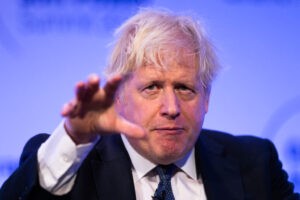Once again, to the delight of our comment class, who will take any opportunity to ignore the country’s permanent state of crisis for the comfortable distractions of meaningless Westminster rigmarole, Boris Johnson has scuttled from his hiding-hole to bask in the attention of the press like a fat lizard in the summer sun. If we lived in a functioning country, with a functioning government, another season of the Johnson Show might be moderately entertaining, but unfortunately for us we do not.
At a time when the global order is undergoing a period of total, historic change, the effects of which have struck every household in the country, the Conservatives have committed themselves to conserving only yesterday’s orthodoxies. They are overseeing the withdrawal of the state from policing anything other than online discourse, presiding over the most unsustainably liberal immigration regime in British history and doubling down on an economic model the rest of the world is competing to supersede. As a result, wage growth has stagnated for a generation, the longest period without increasing affluence since the Napoleonic Wars, while rocketing mortgage rates and inflation make even the decently paid feel a new pang of anxiety at the end of each month. Homeownership and family formation, the basic building blocks of a conservative worldview, have both been made needlessly difficult by 13 wasted years of Tory governance. In Tory Britain, nothing works any longer, least of all the government.
That Johnson fell foul of the excessive Covid regulations he himself introduced is the perfect encapsulation of the party’s impeccable record of failure. Seemingly proud of their inability to govern a country, Conservative ministers grandly announce policies they will never deliver on Twitter, complain that their governance is frustrated by state functionaries they were elected to control, and give fringe conference speeches complaining about the pernicious effects of legislation they themselves introduced.
Johnson’s latest self-exculpatory missive is thus the perfect distillation of Conservative governance, where failure is always someone else’s fault. Endlessly railing against the blob, the Conservative Party is surely the blob’s purest and most baleful incarnation — a self-defeating cabal of WhatsApp gossipers whose horizons extend no further than the Westminster Lobby. Yet it really did seem, just two years ago, that the Conservative Party’s hold on power might last unchallenged for a generation. The Tory self-implosion since then must count as one of the most spectacular failures in British political history: presented with an open goal, the party dribbled unopposed to the victory line before ritually disembowelling itself in front of a horrified crowd.
In retrospect, Johnson’s squandering of a historic opportunity to reshape Britain may have been inevitable. All his personal failings, the lying and unfaithfulness that inspire such liberal outrage, are just subcategories of his greatest flaw: the pathological craving to over-promise without ever delivering. The nation was only another dalliance which, having won, his flawed nature compelled him to neglect. The much-mythologised new Red Wall voter base he seduced has now returned, shame-faced, to its longstanding partner: the only legacy of Johnson’s 2019 victory is a short-lived crop of northern MPs of staggering awfulness. Instead of ushering in a new era of mass prosperity and revitalised industry, we are compelled to witness, in the dying days of this government, Red Wall MPs of the party of social aspiration commanding their voters to eat value baked beans and stop complaining. But if the party could be forgiven Johnson, who at least delivered one brief moment of electoral glory, its subsequent coronation of Liz Truss, the Lady Jane Grey of zombie neoliberalism, alone deserves annihilation.
At precisely the moment the world firmly rejected neoliberalism, the Conservative Party chose, through an opaque and arrogantly self-absorbed internal conclave, its last true zealot to intensify Britain’s commitment to the failed ideology. Foiled at achieving her set-piece open borders deal with India only by her demolition of the British economy, Truss’s only lasting achievement has been to drive the party’s dependable middle class Blue Wall voter base towards Labour.
Even at the best of times, that the party could be so absorbed by its own internal drama to unleash a figure as simultaneously vapid and dangerous as Truss anywhere near the highest office of state would be just cause to forfeit power. But that it could do so at such a moment of grave national crisis is simply inexcusable, a dereliction of duty so severe that even the Conservative Party’s continued existence now seems of dubious merit. At this point, the furore over Truss and Johnson’s doling out of honours to their cronies seems misplaced: they have gone already this far in discrediting the government and party, why should they not bring the whole thing crashing down?
After all this, the broadly competent managerialism of the Sunak government, now rocked by the vengeful blond revenant, seemed to at least provide us with some breathing space before the inevitable Labour victory. Sunak’s foreign policy, aligning with Europe by rejecting open confrontation with China while maintaining sufficient distance from the rising economic hegemon, is unexpectedly modest and sensible: in different circumstances, he could have been a great Foreign Secretary. His economic policy is essentially that of running the country on autopilot, following a route programmed back in the 2010s. While he has no convincing answers to Britain’s accumulating dysfunction, he is at least unlikely to dramatically worsen the situation in the limited time history has allotted him. Ironically more conservative than either Johnson or Truss, perhaps the last two true liberals of a dying era, Sunak is nevertheless fated to lead the party towards its electoral doom, a steady pair of hands driving the nation safely towards Starmer, while Johnson loudly smears his mess across the back seat.
At this point, a more convincing conservative case can surely be made for Labour than for the Conservative Party. A period of Labour rule, resetting Britain’s economic model on a more resilient and sustainable path, may ironically provide a more secure basis for some future, more competent Tory government: in the long-term, indeed, the Conservative Party’s very survival may depend on a Labour victory. But if it is to survive — and the desirability of this outcome, given its performance, is far from obvious — then the Tories require a period out of office to define their worldview and devise a convincing path to achieving it.
Yet, instead of showcasing the exciting new frontiers of conservatism, the recent Natcon conference — in which a chaotically-assembled mixture of economic liberals, social conservatives and inane culture war loudmouths argued for directly opposing things — only highlighted the lack of intellectual heft within the modern British Right. Simply, the conservative movement in Britain does not have a deep bench of talent from which to draw future inspiration, much less to govern now. If Johnson’s return can still be pined for by frontbench loyalists, if he is the best they can hope for, then the rot is surely terminal.
The outlook, for conservatives, must now be one of weary resignation. In our constricted party system, the space that is in continental Europe filled by competent Right-wing parties is in Britain taken up by conspiracy theorists and Trussonomics advocates moonlighting as talkshow hosts. Filling this gap, Starmer’s Labour has already outflanked the Conservative Party from the Right on law and order and immigration, purging the party of the remnants of the Corbynite Left whose professed adherence to socialism was always outweighed by their more passionate commitment to social liberalism.
To the chagrin of Left-liberals, whose enthusiasm for the normalisation of crime is only matched by that of the Conservative Party, Starmer can convincingly point to his record as Director of Public Prosecutions in claiming that a Labour victory will lead to the return of robust policing. On immigration, while the Labour benches still contain free-movement zealots, it’s difficult to see, short of dispatching press gangs around the world to abduct random passersby, how Labour can surpass either Truss’s enthusiasm for open borders or the unprecedented visa liberalisation regime Johnson intentionally introduced.
But it is on economic questions, those bread-and-butter material circumstances that define a nation’s political character, that Labour has now superseded the Conservative Party’s fossilised orthodoxies, pledging a revived industrial strategy based on national resilience, a massive program of housebuilding, and expansion of affordable childcare to ease the burden of family formation. Just as the Biden administration has transpired, on foreign policy and the economy, to be simply the competent version of Trumpism, it may take the Labour Party to bring about the Johnsonian economic settlement its creator was too lazy and disorganised to achieve.
After 13 years in power, the Conservative Party has achieved nothing, conserving only an ideological attachment to an economic model that has evaporated, and a rhetorical commitment to a social order its own policies have destroyed. Clamouring for the Lobby’s attention once again, Boris eloquently makes the case, if anyone is still wavering, for a Labour government as soon as possible. After enduring another year of drift and managed decline, a period of Labour governance may yet achieve some traditionally conservative ends, in home ownership and family formation, in the rebirth of a British industrial strategy and the fostering of economic resilience in a contested, multipolar world. The return of Johnson’s unquiet ghost, waving his mouldering rags of failure at all around him, may therefore do the nation some good: if he drags the Conservative Party into the political grave with him, Boris may finally make his mark on history.
Disclaimer
Some of the posts we share are controversial and we do not necessarily agree with them in the whole extend. Sometimes we agree with the content or part of it but we do not agree with the narration or language. Nevertheless we find them somehow interesting, valuable and/or informative or we share them, because we strongly believe in freedom of speech, free press and journalism. We strongly encourage you to have a critical approach to all the content, do your own research and analysis to build your own opinion.
We would be glad to have your feedback.
Source: UnHerd Read the original article here: https://unherd.com/



